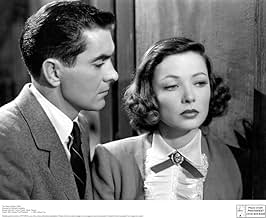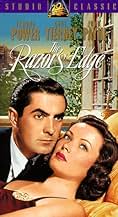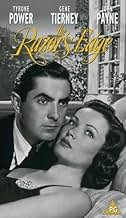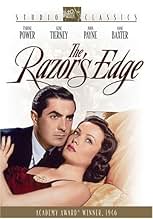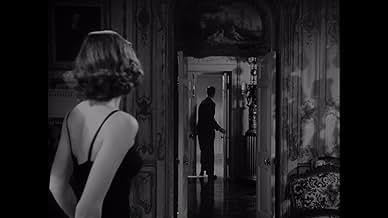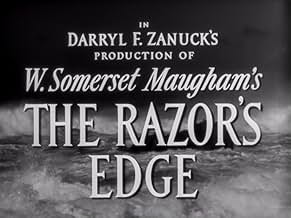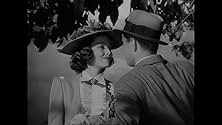IMDb-BEWERTUNG
7,3/10
7140
IHRE BEWERTUNG
Füge eine Handlung in deiner Sprache hinzuAn adventuresome young man goes off to find himself and loses his socialite fiancée in the process. But when he returns 10 years later, she will stop at nothing to get him back, even though ... Alles lesenAn adventuresome young man goes off to find himself and loses his socialite fiancée in the process. But when he returns 10 years later, she will stop at nothing to get him back, even though she is already married.An adventuresome young man goes off to find himself and loses his socialite fiancée in the process. But when he returns 10 years later, she will stop at nothing to get him back, even though she is already married.
- Regie
- Drehbuch
- Hauptbesetzung
- 1 Oscar gewonnen
- 6 Gewinne & 3 Nominierungen insgesamt
Dorothy Abbott
- Showgirl
- (Nicht genannt)
George Adrian
- Party Guest
- (Nicht genannt)
Demetrius Alexis
- Abbe
- (Nicht genannt)
Olga Andre
- Minor Role
- (Nicht genannt)
John Ardell
- Banker
- (Nicht genannt)
Frank Arnold
- Miner
- (Nicht genannt)
- …
Juan Arzube
- Minor Role
- (Nicht genannt)
Empfohlene Bewertungen
To repeat, this film has everything going for it: top-notch cast, direction, no expense spared in production. It achieved an enthusiastic audience response when it came out. Why does it leave me dissatisfied?
First, it is hard to adapt a complex novel for the stage or screen. It's not impossible. Great authors, Charles Dickens for one, adapted their work for the stage. Some Dickens novels, "Great Expectations" and "Oliver Twist," at the very same time this film was being made, reached the screen magnificently in slimmed-down versions. Not this one. Apparently, Somerset Maugham prepared a screenplay. It was not used. Perhaps that was the mistake. The screenplay that was used follows the novel. But it fails to capture the essence.
Larry, the protagonist, is disillusioned with life, a reasonable reaction to WW I. He goes on his quest for spiritual enlightenment, as in the novel. He finds it, more or less. But what is it? We never know. The novel includes a long digression on that point. The movie omits it. We are left with a rather kitschy picture of a pleasant, peaceful fellow, who tells us he is well on the road to Truth, but never gives us a sign or even a signpost, neither in his speech nor in his behavior. Yet his spiritual search is presented as the key to the whole story. He seeks meaning in the quartiers populaires of Paris and in the coal mines of Picardy. Fine. I had a high school friend who disdained bourgeois life and went off to find fulfillment as a dockworker in Milwaukee. He found egotism. He came away with a happy sense of superiority that let him look down on parasitic rich people. Our Larry goes on to see the guru in the Himalayas. What profound wisdom does he imbibe? We are given no clue. He shuts himself up in a mountaintop retreat, after which he has seen It (capital I) - whatever It is. He can now face mankind. It's an old practice, not confined to Indian gymnosophists. St. Anthony and his fellows, the Desert Fathers, isolated themselves. But the aim was not to rejoin the world. It was to transcend it. Abba Macarius (or one of his fellow desert saints - I'm not sure which) was said to be so otherworldly that his disciples had to hold him down lest his body along with his spirit soar to the realm of God. Larry keeps his feet firmly planted. He returns to society. How is he changed? I can't see it. Tyrone Power plays the very same faintly vacuous character he was before. How does he use his great enlightenment? A little hypnotism to relieve John Payne of chronic migraines. He becomes a one-man AA to cure Sophie off the sauce. (Sophie, by the way, is the only skid-row alcoholic I have ever imagined who can be tracked down because she won't settle for anything less than hugely expensive liqueur.) Now I'm not calling for the movie to add a heavy explanation of transcendental spirituality. But since this is the crux of the story, we ought to get something - instead of nothing.
Anne Baxter richly deserved an Oscar. The rest of the cast makes little impression. Tyrone Power I love as an actor. He just didn't get into this character. Clifton Webb, as usual, is supremely supercilious. No one, except maybe Gladys Cooer, did superciliousness better. But that's it. Cecil Humphreys is a perfectly manicured, made-for-Hollywood yogi. They would have done far better with Sam Jaffe as he was in "Lost Horizon," a really mysterious and effective Wise Man. Gene Tierney - I hate to say it because she was marvelous in many roles - does nothing with this role. It demands much more bite. She is presented as materialistic, self-satisfied, a contrast to the ever-searching Larry. She needs to have, a touch at least, of a hard edge. Gene Tierney is sweetness all the way through, even as she commits one of the cruelest acts put on the screen. Who can sympathize with a person who deliberately inveigles a recovering alcoholic into a room, then plants her alone with a bottle of booze and a glass? The movie cries out for Claire Trevor.
Larry goes off to be a dockworker, or something. Everyone left alive resumes life as before. And we leave the movie theater, or our DVD, with ... what? The novel demands better than that.
First, it is hard to adapt a complex novel for the stage or screen. It's not impossible. Great authors, Charles Dickens for one, adapted their work for the stage. Some Dickens novels, "Great Expectations" and "Oliver Twist," at the very same time this film was being made, reached the screen magnificently in slimmed-down versions. Not this one. Apparently, Somerset Maugham prepared a screenplay. It was not used. Perhaps that was the mistake. The screenplay that was used follows the novel. But it fails to capture the essence.
Larry, the protagonist, is disillusioned with life, a reasonable reaction to WW I. He goes on his quest for spiritual enlightenment, as in the novel. He finds it, more or less. But what is it? We never know. The novel includes a long digression on that point. The movie omits it. We are left with a rather kitschy picture of a pleasant, peaceful fellow, who tells us he is well on the road to Truth, but never gives us a sign or even a signpost, neither in his speech nor in his behavior. Yet his spiritual search is presented as the key to the whole story. He seeks meaning in the quartiers populaires of Paris and in the coal mines of Picardy. Fine. I had a high school friend who disdained bourgeois life and went off to find fulfillment as a dockworker in Milwaukee. He found egotism. He came away with a happy sense of superiority that let him look down on parasitic rich people. Our Larry goes on to see the guru in the Himalayas. What profound wisdom does he imbibe? We are given no clue. He shuts himself up in a mountaintop retreat, after which he has seen It (capital I) - whatever It is. He can now face mankind. It's an old practice, not confined to Indian gymnosophists. St. Anthony and his fellows, the Desert Fathers, isolated themselves. But the aim was not to rejoin the world. It was to transcend it. Abba Macarius (or one of his fellow desert saints - I'm not sure which) was said to be so otherworldly that his disciples had to hold him down lest his body along with his spirit soar to the realm of God. Larry keeps his feet firmly planted. He returns to society. How is he changed? I can't see it. Tyrone Power plays the very same faintly vacuous character he was before. How does he use his great enlightenment? A little hypnotism to relieve John Payne of chronic migraines. He becomes a one-man AA to cure Sophie off the sauce. (Sophie, by the way, is the only skid-row alcoholic I have ever imagined who can be tracked down because she won't settle for anything less than hugely expensive liqueur.) Now I'm not calling for the movie to add a heavy explanation of transcendental spirituality. But since this is the crux of the story, we ought to get something - instead of nothing.
Anne Baxter richly deserved an Oscar. The rest of the cast makes little impression. Tyrone Power I love as an actor. He just didn't get into this character. Clifton Webb, as usual, is supremely supercilious. No one, except maybe Gladys Cooer, did superciliousness better. But that's it. Cecil Humphreys is a perfectly manicured, made-for-Hollywood yogi. They would have done far better with Sam Jaffe as he was in "Lost Horizon," a really mysterious and effective Wise Man. Gene Tierney - I hate to say it because she was marvelous in many roles - does nothing with this role. It demands much more bite. She is presented as materialistic, self-satisfied, a contrast to the ever-searching Larry. She needs to have, a touch at least, of a hard edge. Gene Tierney is sweetness all the way through, even as she commits one of the cruelest acts put on the screen. Who can sympathize with a person who deliberately inveigles a recovering alcoholic into a room, then plants her alone with a bottle of booze and a glass? The movie cries out for Claire Trevor.
Larry goes off to be a dockworker, or something. Everyone left alive resumes life as before. And we leave the movie theater, or our DVD, with ... what? The novel demands better than that.
W Somerset Maugham's is a character in his own "The Razor's Edge". He's played by Herbert Marshall and he's given the hardest lines to deliver: "He looks extraordinarily happy, calm yet aloof" He's talking about Larry, Tyrone Power's character, after his enlightening trip to India. Power returns and reintroduces himself in the life of Isabel, played by the impossibly beautiful Gene Tirney. The world that Powers discovers in India will give this all consuming melodrama a spiritual tinge. Edmund Goulding choreographs the unfolding with surprising results. Tirney's beauty permeates the whole film and her character is as truthful as it is cruel although she doesn't mean to be neither truthful nor cruel. Anne Baxter as the tragic Sophie gets an Academy Award while Clifton Webb camps it out shamelessly. Loved the scene of the coin and John Payne's headache. Gene Tirney's reaction to Tyrone Power, as he works the "miracle", is the best acting of her entire career. Deserves to be seen.
The Razor's Edge (1946)
A stately, dramatic, richly nuanced film about love, true love, and the love of life. It's about what matters, and what doesn't, in a high society world George Cukor could have filmed, but this is by director Edmund Goulding, coming off of a series of war films, and with the great Grand Hotel from 1932 in his trail. Some people will find this a touch stiff or slow, or rather too nuanced, but I think none of the above at all. It has the richness of the Somerset Maugham novel it is based on, and Goulding had just filmed (the same year) Of Human Bondage, another Maugham novel. In both cases, the writer contributed to the screenplay, and the combination of the two of them seems really perfect.
Tyrone Power is an interesting lead man, as the idealistic and handsome Larry Darrell, and in some ways his restraint and almost studied dullness at times is maybe what the film needs for its rich, calm trajectory through the twenty years it covers. He's as stable and "good" as the wise, knowing figure of the author, who appears in the form of actor Herbert Marshall. Gene Tierney as Power's counterpart and eventually counterpoint plays the spoiled woman with cool, dramatic perfection. She's got energy and edge and beauty from every angle, and she maintains just that slightest duplicity in every scene, so you are kept on your toes.
The only forced and almost laughable section is the one that demands we think profound thoughts...the guru in India being guru to our hero. Unfortunately, it lasts for fifteen minutes, and though there is a spiritual necessity to the experience he has there, this spiritual aspect is implied just as fully in the worldly scenes that follow. I can picture a far better movie without this insert, and I can picture the director picturing it, too. Someone knows why it got patched in, and for whom, but this is what we have.
It has to be said the filming, as conservative as it is in many ways, is spot-on gorgeous. The brightly lit, ornamented, busy sets are actually inhabited by the camera, and the figures move together not only across the field, but front to back as well, in triangles and curves of visual activity, yet with fluidity--it's all contained and lyrically delicious. This is done without ostentatious mood, without sharp angles and bold lighting, but instead with spatial arrangements, always full, no emptiness, no great shadows, always something more to see. A great example, easy to find, is the very last scene, just before the shot on the boat when the end titles run. Watch how Marshall walks the long way around Tierney, and then she walks around him, and the camera keeps them framed side to side, front to back. It's nothing short of brilliant, and yet, in style, so different than say Toland doing Kane or, at another extreme, Ozu doing Tokyo Story. But no less spectacular.
At one point, a minor character, a defrocked priest, says to Darrell in a working class bar, "You sound like a very religious man who does not believe in God." The movie is really about godliness, or what Maugham calls "goodness" in the end. And some people have it, and share it, and make the world better, God or no God.
A stately, dramatic, richly nuanced film about love, true love, and the love of life. It's about what matters, and what doesn't, in a high society world George Cukor could have filmed, but this is by director Edmund Goulding, coming off of a series of war films, and with the great Grand Hotel from 1932 in his trail. Some people will find this a touch stiff or slow, or rather too nuanced, but I think none of the above at all. It has the richness of the Somerset Maugham novel it is based on, and Goulding had just filmed (the same year) Of Human Bondage, another Maugham novel. In both cases, the writer contributed to the screenplay, and the combination of the two of them seems really perfect.
Tyrone Power is an interesting lead man, as the idealistic and handsome Larry Darrell, and in some ways his restraint and almost studied dullness at times is maybe what the film needs for its rich, calm trajectory through the twenty years it covers. He's as stable and "good" as the wise, knowing figure of the author, who appears in the form of actor Herbert Marshall. Gene Tierney as Power's counterpart and eventually counterpoint plays the spoiled woman with cool, dramatic perfection. She's got energy and edge and beauty from every angle, and she maintains just that slightest duplicity in every scene, so you are kept on your toes.
The only forced and almost laughable section is the one that demands we think profound thoughts...the guru in India being guru to our hero. Unfortunately, it lasts for fifteen minutes, and though there is a spiritual necessity to the experience he has there, this spiritual aspect is implied just as fully in the worldly scenes that follow. I can picture a far better movie without this insert, and I can picture the director picturing it, too. Someone knows why it got patched in, and for whom, but this is what we have.
It has to be said the filming, as conservative as it is in many ways, is spot-on gorgeous. The brightly lit, ornamented, busy sets are actually inhabited by the camera, and the figures move together not only across the field, but front to back as well, in triangles and curves of visual activity, yet with fluidity--it's all contained and lyrically delicious. This is done without ostentatious mood, without sharp angles and bold lighting, but instead with spatial arrangements, always full, no emptiness, no great shadows, always something more to see. A great example, easy to find, is the very last scene, just before the shot on the boat when the end titles run. Watch how Marshall walks the long way around Tierney, and then she walks around him, and the camera keeps them framed side to side, front to back. It's nothing short of brilliant, and yet, in style, so different than say Toland doing Kane or, at another extreme, Ozu doing Tokyo Story. But no less spectacular.
At one point, a minor character, a defrocked priest, says to Darrell in a working class bar, "You sound like a very religious man who does not believe in God." The movie is really about godliness, or what Maugham calls "goodness" in the end. And some people have it, and share it, and make the world better, God or no God.
British storyteller W(illiam) Somerset Maugham's 1944 speculative novel "The Razor's Edge," as did his earlier semi-autobiographical "Of Human Bondage," won a devoted following when it hit the book shelves, and so 20th Century-Fox wasted no time in securing the screen rights to this mammoth war-era adventure into existentialism. It was a difficult, elephantine undertaking but they somehow managed to carve out a screenplay and present the whole package within two years of the novel's first print.
Awesomely produced and directed, the resulting movie, for the most part, propels Maugham's central theme -- that there is good and bad in all human beings. The focus centers in on the long, spiritual quest of Larry Durrell, a basically virtuous individual who, surrounded by wealth, beauty and privilege, abandons his enviable but superficial trappings to pursue a more humble, meaningful life. Oddly enough, it's the superficial elements of the story and the more pretentious characters that hold up "The Razor's Edge," while the spiritual scenes grow flat and weary, often times stopping the action dead in its tracks.
In casting Tyrone Power as the protagonist, one finds THE major flaw in its presentation. Tagged as a pretty boy for most of his career, he managed to show only glimpses of dramatic aptitude from time to time ("Witness for the Prosecution" comes to mind). Earnest and utterly sincere in his approach, Power simply lacks the power (sorry) and the depth to carry off this complex, confused, anachronistic soul-searcher. His Durrell seems better suited amongst the shallow and superficial. One only wonders what a Robert Donat or Fredric March might have done with such a role.
Surrounding Power, however, is a stellar list of names that gussies up this production, and it is in them that we find the film's emotional impact. In particular, Gene Tierney offers one of her finest performances as Isabel, the grasping, captivating socialite obsessed with Durrell, who shows her true colors in the end when goodness and all else fails to win her the love of a man. Like Power, Tierney is a flawless, incredibly photogenic beauty who tended toward posturing instead of acting. Here she is allowed to capitalize on her tendency towards elegant frippery, offering a cool, intriguing portrait of a woman who can and will never have enough.
We are also blessed with the presence of Clifton Webb, the epitome of smug elegance, who is true to form here as the meticulous, wasp-tongued prig who is not use to being told "no." As in the classic "Laura," Webb is handed the film's most delicious lines as his character goes about buffering his unhappiness with scorn and witty sarcasm. He would warm over this character recipe many times in movies, but darned if you don't keep going back for second helpings. He is delightfully hateful and absolutely mesmerizing. Anne Baxter as the helpless, tragic Sophie is heart-wrenching, giving a florid, Oscar-winning performance that lingers long after the final reel. She, not Power, is the heart and ravaged soul of this piece. The hospital scene following her horrific accident will rip you apart, as will her subsequent degradation into alcohol and prostitution. Known for her flashy, theatrical roles, Baxter plays Sophie for all its worth.
John Payne is typically upright and appealing and does what he can in a rather stiff, thankless "other man" part, while suave Herbert Marshall, who, in reality, lost a leg in WWI but continued to act (often in a chair), portrays Maugham himself with customary flair.
Granted, "The Razor's Edge" is no "Lost Horizon" in the metaphysical department, but on its own it is quite admirable and engrossing entertainment. It manages to hold up exceedingly well under its great length and weight, feels only slightly dated, and prides itself with gorgeous production values and a handsome, handsome cast.
Awesomely produced and directed, the resulting movie, for the most part, propels Maugham's central theme -- that there is good and bad in all human beings. The focus centers in on the long, spiritual quest of Larry Durrell, a basically virtuous individual who, surrounded by wealth, beauty and privilege, abandons his enviable but superficial trappings to pursue a more humble, meaningful life. Oddly enough, it's the superficial elements of the story and the more pretentious characters that hold up "The Razor's Edge," while the spiritual scenes grow flat and weary, often times stopping the action dead in its tracks.
In casting Tyrone Power as the protagonist, one finds THE major flaw in its presentation. Tagged as a pretty boy for most of his career, he managed to show only glimpses of dramatic aptitude from time to time ("Witness for the Prosecution" comes to mind). Earnest and utterly sincere in his approach, Power simply lacks the power (sorry) and the depth to carry off this complex, confused, anachronistic soul-searcher. His Durrell seems better suited amongst the shallow and superficial. One only wonders what a Robert Donat or Fredric March might have done with such a role.
Surrounding Power, however, is a stellar list of names that gussies up this production, and it is in them that we find the film's emotional impact. In particular, Gene Tierney offers one of her finest performances as Isabel, the grasping, captivating socialite obsessed with Durrell, who shows her true colors in the end when goodness and all else fails to win her the love of a man. Like Power, Tierney is a flawless, incredibly photogenic beauty who tended toward posturing instead of acting. Here she is allowed to capitalize on her tendency towards elegant frippery, offering a cool, intriguing portrait of a woman who can and will never have enough.
We are also blessed with the presence of Clifton Webb, the epitome of smug elegance, who is true to form here as the meticulous, wasp-tongued prig who is not use to being told "no." As in the classic "Laura," Webb is handed the film's most delicious lines as his character goes about buffering his unhappiness with scorn and witty sarcasm. He would warm over this character recipe many times in movies, but darned if you don't keep going back for second helpings. He is delightfully hateful and absolutely mesmerizing. Anne Baxter as the helpless, tragic Sophie is heart-wrenching, giving a florid, Oscar-winning performance that lingers long after the final reel. She, not Power, is the heart and ravaged soul of this piece. The hospital scene following her horrific accident will rip you apart, as will her subsequent degradation into alcohol and prostitution. Known for her flashy, theatrical roles, Baxter plays Sophie for all its worth.
John Payne is typically upright and appealing and does what he can in a rather stiff, thankless "other man" part, while suave Herbert Marshall, who, in reality, lost a leg in WWI but continued to act (often in a chair), portrays Maugham himself with customary flair.
Granted, "The Razor's Edge" is no "Lost Horizon" in the metaphysical department, but on its own it is quite admirable and engrossing entertainment. It manages to hold up exceedingly well under its great length and weight, feels only slightly dated, and prides itself with gorgeous production values and a handsome, handsome cast.
This film, and the book on which it is based, made strong impressions on me in my youth, but even more so now that I am past middle age. A magnificent cast - Tyrone Power, Gene Tierney, Anne Baxter, Clifton Webb, John Payne, Herbert Marshall, help to tell the story of a man who walks "in another man's shoes" -- and totally to his own drummer -- after the first world war. In his quest for spirituality and goodness, he is at odds with the materialism and obsession around him. The different layers of "The Razor's Edge" demand attention: Larry's physical desire for Isabel, a woman it turns out he doesn't even know; Isabel's cold-heartedness and desire to possess Larry; and Larry's search for the meaning of life, while the people he loves disintegrate around him from lack of values or hope. These are all seen through the eyes of Somerset Maugham, played by Marshall. Larry's final confrontation scene with Isabel (Tierney) about Sophie (Baxter) is bone-chilling -- Power, who had a tendency to be sometimes stiff and a bit removed from his material, uses that flaw to excellent advantage as Larry Darrell. It's not a showy role, but he's wonderful, and he's reading of poetry in Sophie's room is unforgettable.
Highly recommended.
Highly recommended.
Wusstest du schon
- WissenswertesThere were 89 different sets built for the film, which had the longest shooting schedule for any film at the studio to that date. According to some news items, the film broke all previous studio box office records.
- PatzerAfter a promising beginning, in which the clothes and hairstyles of 1919 are pleasantly and reasonably accurately interpreted, as soon as it gets to 1920, then on to 1930, and beyond, Gene Tierney's hairstyle is in an unchanging, although very attractive, 1946 mode, and all of her clothes, designed by husband Oleg Cassini, except for lower hemlines, are strictly 1946, complete with the ubiquitous shoulder pads of that era. Anne Baxter's ensembles look more like Tierney/Cassini rejects, an unhappy compromise between opposing styles.
- Crazy CreditsWhen the screenplay credits are shown, a curious symbol appears near W. Somerset Maugham's name. It's a symbol meant to ward off the evil eye, and it more often than not appeared on the covers of many of Maugham's novels.
- VerbindungenFeatured in 50 Jahre 20th Century Fox (1997)
Top-Auswahl
Melde dich zum Bewerten an und greife auf die Watchlist für personalisierte Empfehlungen zu.
- How long is The Razor's Edge?Powered by Alexa
Details
- Erscheinungsdatum
- Herkunftsland
- Sprachen
- Auch bekannt als
- El filo de la navaja
- Drehorte
- Denver, Colorado, USA(2nd unit exteriors, backgrounds, mountains)
- Produktionsfirma
- Weitere beteiligte Unternehmen bei IMDbPro anzeigen
Box Office
- Budget
- 1.200.000 $ (geschätzt)
- Laufzeit2 Stunden 25 Minuten
- Farbe
- Seitenverhältnis
- 1.33 : 1
Zu dieser Seite beitragen
Bearbeitung vorschlagen oder fehlenden Inhalt hinzufügen


